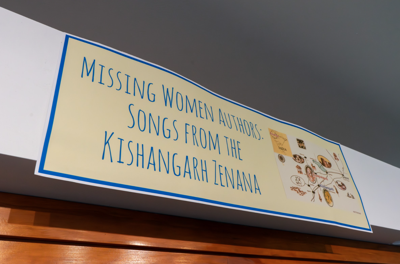A beautiful woman in profile. Pearls drape from her neck, bangles adorn her wrists. A veil shrouds her long hair in mystery. Her expression calm and sure, her presence commanding.
The famed “Indian Mona Lisa” painting was commissioned by the Prince of Kishangarh to celebrate his lover, Bani Thani. Yet her gaze assures us that she was more than a muse, she was a poet in her own right.
The Allen Library exhibit, “Missing Women Authors: Songs from the Kishangarh Zenana,” running Nov. 1 through Nov. 30, displays the poetry of the women surrounding renowned bhakti poet, Nagaridas, crown-prince of Kishangarh during the first half of the 18th century.
Heidi Pauwels, professor of Asian languages and literature, traveled to Kishangarh, India, searching for information on Nagaridas. The royal family granted Pauwels access to the archives of the Kishangarh Durbar Library.
Leafing through a particular manuscript, Pauwels encountered poems signed by a mysterious pen name, Rasikbihārī, intertwined with poems by Nagaridas and others. The corrections in the margins, indicating a poet’s workbook, confirm that it was Bani Thani’s performance diary.
Although Nagaridas included some of Bani Thani’s work in his own anthologies, these particular poems have never been seen before. Pauwels’ latest book, “The Voice of the Indian Mona Lisa,” recounts her remarkable story.
Pauwels was able to match the couple’s poems by close comparison, noting when they use the same word or unusual expression.
“In some cases, her poems were the ones that he responded to, rather than the other way around,” Pauwels said. “So they could break some hierarchy to some extent.”
Unlike her poetry, Bani-thani’s story was not penned in gold.
According to Pauwels, although the court is reluctant to share the archives, there is evidence that Bani Thani was purchased at the Delhi slave market to be a singer for the queen. It is also speculated that Bani Thani eventually became a concubine for the king, complicating her clandestine relationship with Nagaridas.
Nagaridas and Bani Thani’s poetry may have been a way to secretly express their intimacy.
“The poems are all about ideal love of Radha and Krishna,” Pauwels said. “So where does it shade then into the relationship between this concubine and her patron?”
UW graduate student Anjali Yadav recorded the poems sung at Kachariya Pith temple to include in the multimedia exhibit. Although these are 18th-century songs, Yadav shares that they are part of living traditions. Devendra Soni, a singer featured within the exhibit, is from a different religious sect from the temple.
“That’s when I realized maybe the boundaries between these sects are not as strong as people think,” Yadav said.
The collaborative efforts of Pauwels, Yadav, and Deepa Banerjee, UW South Asian studies librarian, commemorate the women of the cannon of devotional Hindi literature.
Reach contributing writer Julia Gries at arts@dailyuw.com. Twitter: @juliaagries
Like what you’re reading? Support high-quality student journalism by donating here.





(0) comments
Welcome to the discussion.
Log In
Keep it Clean. Please avoid obscene, vulgar, lewd, racist or sexually-oriented language.
PLEASE TURN OFF YOUR CAPS LOCK.
Don't Threaten. Threats of harming another person will not be tolerated.
Be Truthful. Don't knowingly lie about anyone or anything.
Be Nice. No racism, sexism or any sort of -ism that is degrading to another person.
Be Proactive. Use the 'Report' link on each comment to let us know of abusive posts.
Share with Us. We'd love to hear eyewitness accounts, the history behind an article.